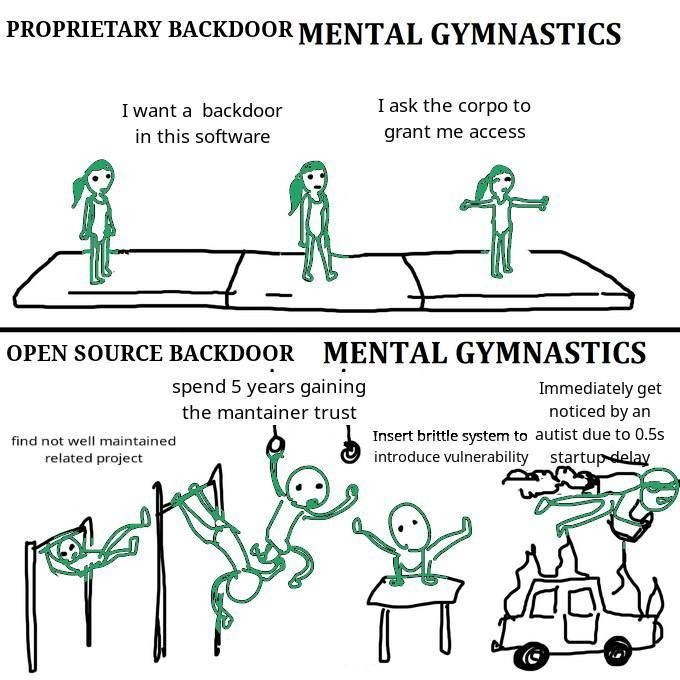I have been thinking about self-hosting my personal photos on my linux server. After the recent backdoor was detected I'm more hesitant to do so especially because i'm no security expert and don't have the time and knowledge to audit my server. All I've done so far is disabling password logins and changing the ssh port. I'm wondering if there are more backdoors and if new ones are made I can't respond in time. Appreciate your thoughts on this for an ordinary user.
How do you know there isn't a logic bug that spills server secrets through an uninitialized buffer? How do you know there isn't an enterprise login token signing key that accidentally works for any account in-or-out of that enterprise (hard mode: logging costs more than your org makes all year)? How do you know that your processor doesn't leak information across security contexts? How do you know that your NAS appliance doesn't have a master login?
This was a really, really close one that was averted by two things. A total fucking nerd looked way too hard into a trivial performance problem, and saw something a bit hinky. And, just as importantly, the systemd devs had no idea that anything was going on, but somebody got an itchy feeling about the size of systemd's dependencies and decided to clean it up. This completely blew up the attacker's timetable. Jia Tan had to ship too fast, with code that wasn't quite bulletproof (5.6.0 is what was detected, 5.6.1 would have gotten away with it).
Show
In the coming weeks, you will know if this attacker recycled any techniques in other attacks. People have furiously ripped this attack apart, and are on the hunt for anything else like it out there. If Jia has other naughty projects out here and didn't make them 100% from scratch, everything is going to get burned.
I think the best assurance is - even spies have to obey certain realities about what they do. Developing this backdoor costs money and manpower (but we don't care about the money, we can just print more lol). If you're a spy, you want to know somebody else's secrets. But what you really want, what makes those secrets really valuable, is if the other guy thinks that their secret is still a secret. You can use this tool too much, and at some point it's going to "break". It's going to get caught in the act, or somebody is going to connect enough dots to realize that their software is acting wrong, or some other spying-operational failure. Unlike any other piece of software, this espionage software wears out. If you keep on using it until it "breaks", you don't just lose the ability to steal future secrets. Anybody that you already stole secrets from gets to find out that "their secrets are no longer secret", too.
Anyways, I think that the "I know, and you don't know that I know" aspect of espionage is one of those things that makes spooks, even when they have a God Exploit, be very cautious about where they use it. So, this isn't the sort of thing that you're likely to see.
What you will see is the "commercial" world of cyberattacks, which is just an endless deluge of cryptolockers until the end of time.
The main solace you can take is how quickly xz was caught: there is a lot of diverse scrutiny on it.
There probably are, there's a reason why super high security systems aim for airgapping of sorts, and even that's not immune.
if you are self hosting and enjoy over-engineering systems... VLANS, ACLs between subnets and IDS/IPS should be part of.your thinking. separate things into zones of vulnerability / least-privilege and maintain that separation with an iron fist. this is a great rabbit hole to fall down if you have the time. however, given a skilled adversary with enough time and money, any network can be infiltrated eventually. the idea is to try to minimize the exposure when it happens.
if the above is not a part of your daily thinking, then don't worry about it too much. use a production OS like Debian stable, don't expose ports to the public internet and only allow systems that should initiate communication to the internet to actually do so (preferably only on their well known protocol ports - if possible).
Afaik, most phones are backdoored that can be abused using tools like "pegasus" which led to a huge indignation in Hungary. I don't belive PCs are exceptions. Intel ME is a proprietary software inside the CPU, often considered as a backdoor in Intel. AMD isn't an exception. It's even weirder that Intel produces chips with ME disabled for governments only.
I do IT security for a living. It is quite complicated but not unrealistic for you to DIY.
Do a risk assessment first off - how important is your data to you and a hostile someone else? Outputs from the risk assessment might be fixing up backups first. Think about which data might be attractive to someone else and what you do not want to lose. Your photos are probably irreplaceable and your password spreadsheet should probably be a Keepass database. This is personal stuff, work out what is important.
After you've thought about what is important, then you start to look at technologies.
Decide how you need to access your data, when off site. I'll give you a clue: VPN always until you feel proficient to expose your services directly on the internet. IPSEC or OpenVPN or whatevs.
After sorting all that out, why not look into monitoring?
Check the source or pay someone to do it.
If you're using closed source software, its best to assume it has backdoors and there's no way to check.
We don't know. But if there were well known backdoors to mainstream security practices we might see more companies that depend on security shutting down, or at least shutting down their online activities. Banks, stock trading, crypto exchanges, other enterprises that handle money, where hacking would be lucrative.
There's a concept of acceptable levels of risk. Companies are not going to shut down out of fear, or miss out on the business opportunities of online presence. There's money to be made.
Even with things as serious as spectre allowing full dumping of CPU and RAM contents simply by loading a website, I can't think of a single company that just said "well shit, better just die".
Serious, potentially business ending, security issues usually have a huge amount of effort when discovered put into mitigations and fixes. Mitigations are usually enough in the immediate "oh shit" phase. Defense in depth is standard practice.
I'm not a security specialist either. I learn new things every day, but this is why my NextCloud is accessible through TailScale only and I have zero ports exposed to the outside world.
The only real convenience I lose is being able to say "check out this thing on my personal server" with a link to someone outside my network, but that's easily worked around.
You can't trust any of it to be totally secure, it's effectively impossible. But, this is true of all software, at least open source is being audited and scrutinised all the time (as demonstrated).
All you can do is follow best practices.
for those unfamiliar: Reflections on trusting trust by Ken Thompson
Good question. I have asking myself the same thing as well. In case of ssh it is possible to use 2FA with a security key, which is something I'd like to put in my todo.txt







